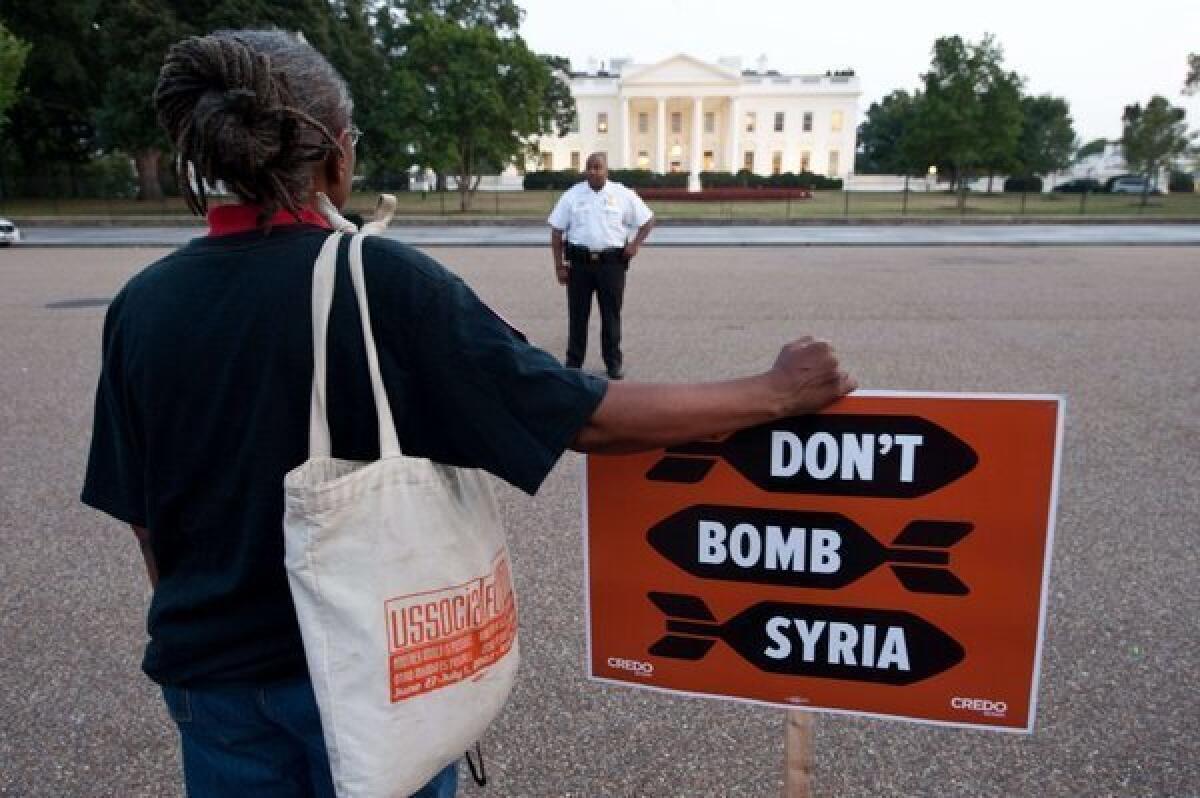In America, not isolationism but skepticism

- Share via
President Obama and his aides were surprised this month by the strength of public opposition to their call for military action against Syria. They shouldn’t have been.
Americans have almost always been reluctant to go to war. In 1939, polls showed that most Americans not only wanted to stay out of war against Nazi Germany, they weren’t even sure they wanted to send military aid to Britain — fearing, perhaps, a slippery slope.
Today, Americans have additional reasons to be skeptical. There’s the toll of wars in Iraq and Afghanistan. There’s the fear that any war in the Middle East will inevitably become a quagmire. And there’s also a fundamental change in American attitudes toward their leaders.
The traditional center in American foreign policy — the rally-around-the-flag reflex presidents could once rely on — has eroded. One reason is partisan polarization: Many conservatives who might have supported military action under a Republican president are disinclined to help Obama in his hour of need. But it’s not all partisan; public confidence in the federal government’s ability to do anything right has reached an all-time low, according to a Gallup Poll released last week.
Does that mean Americans have become isolationists, turning their backs on the world in a way that hasn’t been seen for a century? That’s not so clear.
It’s true that public skepticism about U.S. engagement overseas is up. The Pew Research Center reported recently that 46% of Americans endorsed the sentiment that “the United States should mind its own business internationally and let other countries get along the best they can on their own.”
But that isn’t an unprecedented phenomenon; Pew found anti-interventionist sentiment almost as high in 1974, at the end of the Vietnam War, and in 1992, at the end of the Cold War — and those bouts with isolationism didn’t last forever.
Americans recoiled from Obama’s proposal to attack Syria not only because they are skeptical about military adventures in general but because they weren’t convinced that this particular venture was in the national interest.
“This was kind of a worst case,” said Andrew Kohut, the Pew Center’s founding director. “The public is very gun-shy about intervention, but especially in the Middle East, and especially in a case where the direct U.S. interest isn’t clear. If there were a direct and major threat to the United States, you’d probably see a different picture.”
Indeed, polls taken before earlier conflicts have shown that most Americans are willing to support military action when they are convinced that U.S. security is directly threatened — as they did, for example, when they were convinced (wrongly) by President George W. Bush that Iraq’s Saddam Hussein was building nuclear weapons. On the flip side, most Americans will not support military intervention for purely humanitarian reasons — as Bill Clinton learned in Somalia, Bosnia and Kosovo, operations that were all widely unpopular at the time.
That’s a problem Obama hasn’t solved when it comes to Syria. He asked Americans to watch videotapes of children choking on sarin gas in a Damascus suburb — but that was a humanitarian appeal, not an invocation of national security. He argued that Americans had an interest in bolstering international norms against chemical weapons — but that sounded like an abstract principle, not an immediate threat.
“International norms?” scoffed Sen. John McCain (R-Ariz.), who favors an attack on Syria. “For me to go to a town meeting in Arizona and say the U.S. wants to attack to reinforce international norms is not exactly a convincing argument.”
Others said the president needed to strike Syria to preserve his credibility vis-a-vis Iran — a genuine problem but no closer to a direct threat.
Opposition in Congress to a presidential request to use force has a long history. James Madison ran into a roadblock on Capitol Hill in 1815, and Woodrow Wilson lost a vote in 1917. In 1999, the House of Representatives refused to back Clinton’s air war over Kosovo; Clinton went ahead anyway after winning a vote in the Senate. And even more recently, in June 2011, the House voted against authorizing Obama’s intervention in Libya — one justified mostly on humanitarian grounds — by a lopsided 295 to 123. (The vote came after U.S. strikes on Libya were already underway, and Obama ignored it.)
Americans are often tempted toward disengagement from the world, especially at the end of a long and costly war (in this case, two wars ), and especially when the question involves military action. It happened after Vietnam, it happened after the Cold War, and it’s happening again today.
But after those earlier episodes, public opinion bounced back. Presidents Ronald Reagan, George H.W. Bush and Clinton made the case for American intervention abroad, and in cases when intervention succeeded, public support grew.
With Syria, it became clear that Obama’s request for authority to intervene would be rebuffed. One result is that Americans look and sound more isolationist than they really are. That heightens a challenge that Obama and his successors already faced: not only dealing with a crisis in Syria but rebuilding a national consensus in favor of engagement with the world.
[email protected] Twitter: @DoyleMcManus
More to Read
A cure for the common opinion
Get thought-provoking perspectives with our weekly newsletter.
You may occasionally receive promotional content from the Los Angeles Times.











